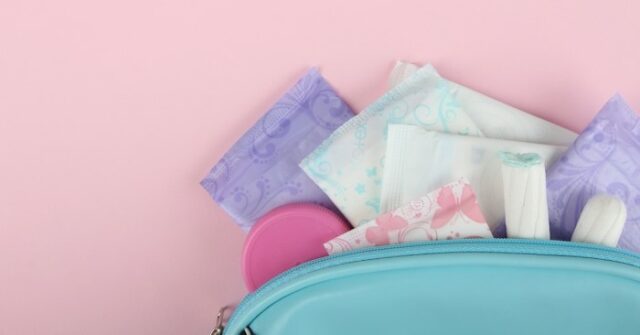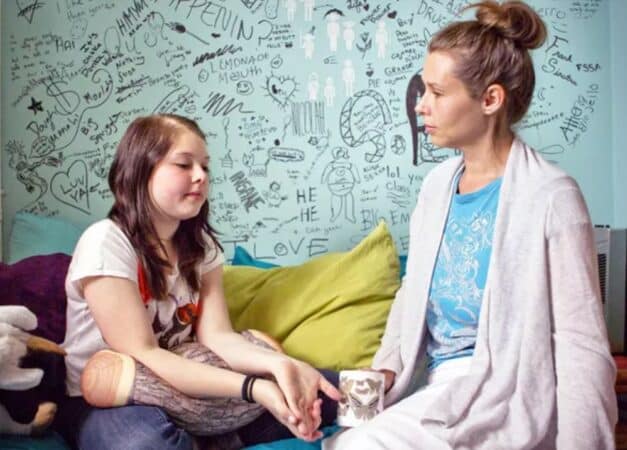Puberty is a time of many transitions, with periods being one of the most challenging. Rachael Wiltshire discusses some strategies that might help to make this transition slightly easier.
FROM THE TIME we got our first ‘period talk’ at school in Year Six until I got my period three years later, I dreaded its arrival.
Every Christmas, I would breathe a sigh of relief that I had made it to the end of another year period-free, and hope that I would still be able to say the same thing the following year.
My Year Seven health teacher mentioned in passing that you couldn’t get your period unless you weighed more than 42kg and so I would weigh myself on the bathroom scales with trepidation, fearing the day when they would show me that I was no longer ‘safe’ from menstruation.
My period arrived on a Saturday morning, the day of the last netball game of the season.
In some ways, I was at least grateful that I had managed to make it to 13 before having to deal with it. But mostly I hated my body for doing this to me.
Every month, I wished that my period would not arrive. As I got older, I got more used to dealing with the practicalities of managing a period, but I still hated it.
I hated feeling like I couldn’t trust my own emotions, because what if it was ‘just my period’? I continued to feel that way until I was 22, when I realised that I didn’t have to just put up with my body doing this to me every month.
I asked my GP for a referral to a gynaecologist to discuss my options and ended up opting to get an Intra Uterine Device (IUD) to make my periods stop. It cost nearly $3000 because I had to be sedated while it was inserted, but I can honestly say that that was the best $3000 I ever spent.
All up, I only ended up dealing with having a period for nine years, but those nine years were traumatic.
The mere thought of ever having a period again is enough to trigger a meltdown for me.
In writing this piece, I have oscillated between tears and wanting to punch something. But writing this piece was incredibly important to me; puberty, and periods, will always be a difficult transition, but there are things that the adults around an autistic child can do to make this phase easier. I hope by sharing my thoughts and experiences, I can help the experience to be less traumatic for autistic children growing up now.
Teaching about Periods
When I was 12, we got a new puppy. We did not immediately get her spayed because we intended for her to have a litter of puppies herself when she was old enough (although that never happened in the end), and this meant she went into heat a couple of times a year.
One night I was in the car with Mum, and I mentioned that I thought it was weird that dogs had to be in heat to get pregnant, because that was different from humans. Mum said, ‘well, at least you know how it works in humans!’
The thing is, despite being terrified of getting a period myself, I was also very interested in the subject of puberty, as long as I could think about it in the abstract.
I spent every lunchtime of Year 7 hiding in the library, reading every book on puberty I could get my hands on.
Books were a much easier way for me to learn about puberty than talking with the adults around me was, and this is likely to be the case for many autistic children. So, if you have a child who refuses to engage in conversations about the changes that will happen to their body, leaving some books out for them to read in their own time may be a less confronting way for them to start getting that information.
Just do not leave them under the Christmas tree, that was an embarrassing gift to unwrap in front of my entire family on Christmas morning!
You may also be able to use your child’s interests as a way of starting conversations about periods. For example, humans are one of the few types of animals that have menstrual cycles; most other mammals have oestrus cycles.
You could set a child who is interested in animals the task of researching the similarities and differences between the two types of cycles as a way into discussing the topic of periods. Similarly, if a child is interested in science, they might find it interesting to learn about the various hormonal fluctuations that control the menstrual cycle.
Of course, books, animals, science or whatever else you can think of are only a way into the conversation; you will still need to check that your child understands what to do when they actually get their period, and they might miss this information if you focus purely on the scientific explanation for why periods happen.
For example, I got 73/75 on our topic test for the puberty unit in Year 7 Health and the marks I lost were on a 10 point question asking you how you would explain periods to a younger sister, because I completely forgot to mention that you need to use pads or tampons when you have your period.
A book or a research project can be a good starting point, however, and they might make the actual conversation part easier for your child; if they have already received most of the information in other ways, the conversation can be shorter!
Sanitary items
When I first got my period, pads and tampons were the only choices available in terms of sanitary items, and there was no way I was using a tampon, so pads it was! Luckily today there are more options, including period underwear and menstrual cups, that an autistic child might find more tolerable.
It is important that your child gets to choose what menstrual products would work best for them.
Sensory issues and executive function challenges will play a big role here. For example, some people might not like the way pads feel and tampons and menstrual cups come with the executive function challenge of remembering to take them out.
For me, the biggest challenge was that I did not want to be constantly reminded that I was having a period, so I needed a solution that required the least possible involvement from me.
If I were to get a period today, I would opt for period underwear for that reason; wearing period underwear does not require your routine to differ significantly from wearing normal underwear.
Stopping Periods
The range of safe hormonal contraceptives we have available these days means that having a period is optional.
If your child does not want to have a period, they should not have to.
A child who is old enough to menstruate is old enough to have a say in what happens to their body, so please inform them that there are ways to stop periods from happening and give them the option of talking this over with a doctor if they would like to.
As an adult, I have been able to read my doctor’s notes, and it turns out my developmental paediatrician mentioned to my Mum that I could be referred to a gynaecologist to have an IUD inserted if I did not cope with having a period.
I wish someone had asked me if that was something I would like to do, because it would have saved me years of anguish.
- Rachael Wiltshire lives in Wellington and found out she was autistic when she was 12.
- She has been passionate about autism advocacy ever since and has spoken at several conferences.
- She is an autistic advisor for Altogether Autism.




